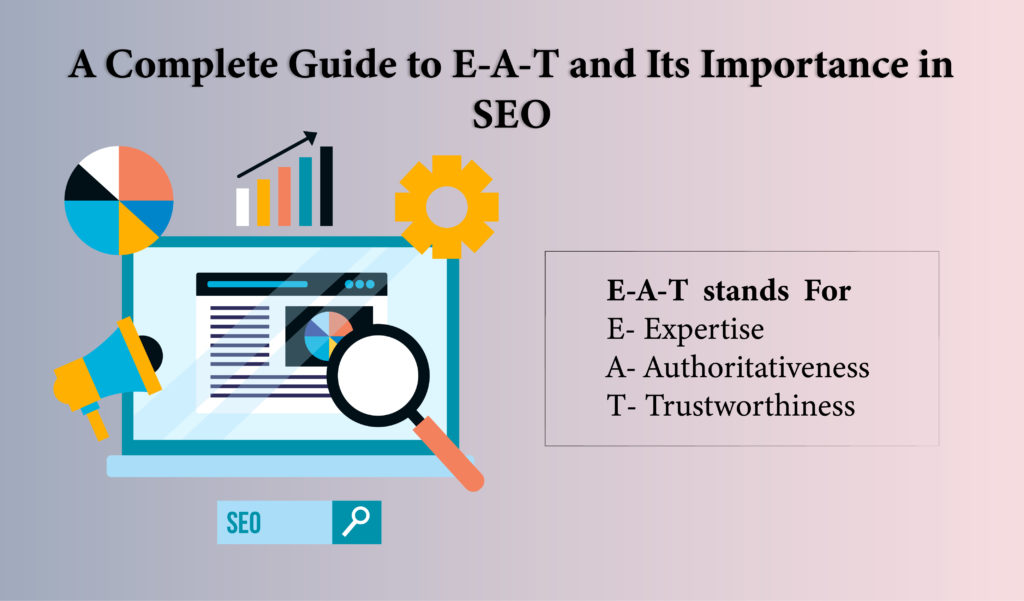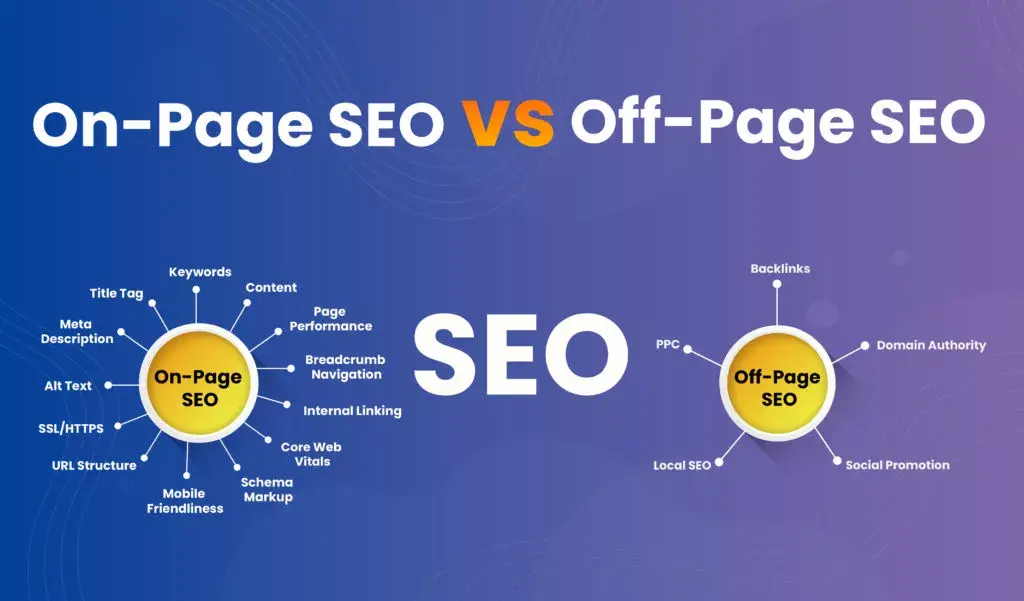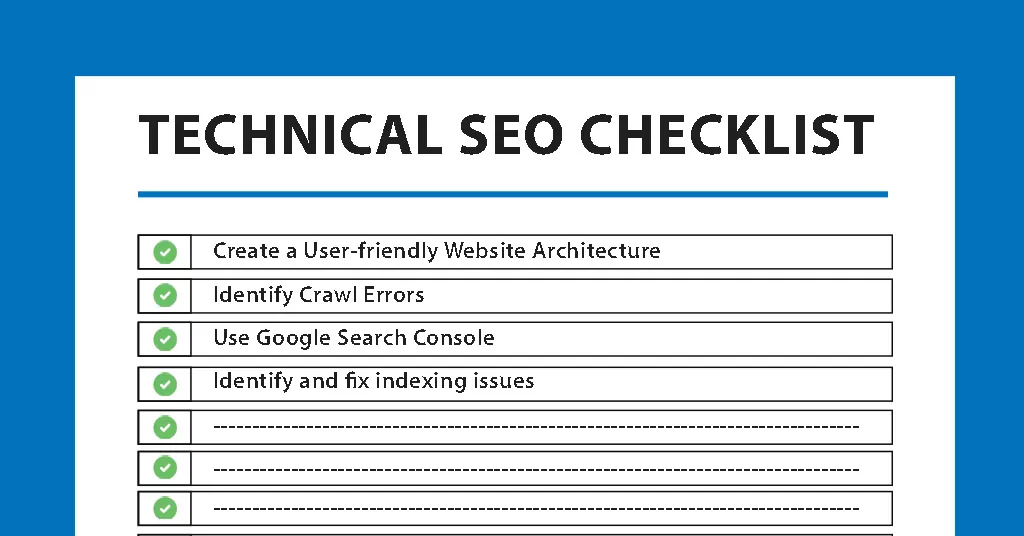A Complete Guide to E-A-T and Its Importance in SEO
Table of contents

Welcome to our blog, where we’ll explore how you can harness the power of Google EAT to enhance your online reputation and achieve greater success. Google EAT (Expertise, Authoritativeness, Trustworthiness) is a set of guidelines that helps search engines rank and prioritize websites based on their credibility and expertise. By following these guidelines and implementing strategies to showcase your expertise, authority, and trustworthiness, you can enhance your online presence and solidify your reputation as a reliable source in your industry. Let’s dive in and discover how you can leverage Google EAT for success!
Introduction to Google EAT
Google EAT, which stands for Expertise, Authoritativeness, and Trustworthiness, is an essential concept to understand if you want to improve your online reputation. In today’s digital age, where information is readily available at our fingertips, users trust search engines like Google to provide them with accurate and reliable information. This is where Google EAT comes into play. But what exactly is Google EAT? It refers to the evaluation criteria that Google uses to assess the quality and credibility of a website or online content. Google wants to ensure that the information it displays in search results is from trustworthy sources. Therefore, the EAT framework helps Google’s algorithms determine which websites or content to prioritize based on their expertise, authoritativeness, and trustworthiness. Why is it important to understand Google EAT? Well, if you want your website or content to rank higher in search results, you need to demonstrate these three crucial aspects. By understanding Google EAT, you can develop a strategy to improve your website’s reputation and credibility, leading to increased visibility and organic traffic. In the following sections of this blog article, we will explore the steps you can take to use Google EAT to improve your online reputation. We will discuss how to create high-quality content that resonates with your audience, optimize it for search engines, utilize social media channels to build brand awareness, monitor and respond to customer reviews, and track performance using analytics tools. Remember, incorporating Google EAT into your online strategy is not only beneficial for your SEO EAT but also for establishing your brand as a credible and trustworthy source of information. Stay tuned for the next sections, where we will dive deeper into these actionable strategies to enhance your online reputation and drive meaningful engagement.

What is E-A-T and why Google EAT is important?
Google EAT, also known as Expertise, Authoritativeness, and Trustworthiness, is a crucial concept in building and maintaining a solid online reputation. When it comes to search engine rankings and user trust, Google EAT plays a significant role. It is a set of criteria that Google uses to assess the quality of a website and its content.
Why Google EAT is important?
Firstly, expertise refers to the level of knowledge and expertise demonstrated by the content creators and the website as a whole. Google highly values websites that are created by experts in their respective fields. Therefore, it is vital to establish yourself or your brand as knowledgeable and trustworthy in your industry. Secondly, authoritativeness is all about the reputation and credibility of the content creators and the website itself. Building a strong reputation as a reliable source of information is crucial for gaining Google’s trust and ranking higher in search results. Lastly, trustworthiness focuses on the reliability and transparency of the website and its content. This includes having clear and accessible contact information, providing accurate and up-to-date information, and delivering a secure and trustworthy user experience. In summary, Google EAT plays a vital role in improving your online reputation because it determines how Google perceives the expertise, authoritativeness, and trustworthiness of your website. By focusing on these aspects, you can establish yourself as a trusted authority in your industry, gain higher search engine rankings, and ultimately build a positive online reputation.
Steps to Use Google EAT to Improve Your Online Reputation
Now that we understand what Google EAT is and why it’s important, let’s dive into the steps you can take to use this concept to enhance your online reputation. The first crucial step is to create high-quality content that is relevant to your audience. By offering valuable information and expertise, you not only establish yourself as a trusted source but also increase the likelihood of gaining positive reviews and feedback.
Google EAT (Expertise, Authoritativeness, and Trustworthiness) is an important concept that Google uses to evaluate the reputation and quality of websites. By adhering to EAT principles, you can improve your online reputation and increase your chances of ranking well in search engine results. Here are the steps you can take to utilize Google EAT effectively:
- Build and Showcase Expertise:
- Clearly define your niche and target audience.
- Demonstrate your expertise by creating high-quality, informative, and well-researched content.
- Include author bylines and author bios to establish credibility and demonstrate the expertise of your content creators.
- Highlight relevant qualifications, certifications, or industry recognition.
- Establish Authoritativeness:
- Develop a backlink strategy to build high-quality, authoritative backlinks to your website.
- Collaborate with industry experts, influencers, or reputable publications to establish your brand as an authority.
- Participate in industry events, conferences, and webinars as a speaker or panelist.
- Highlight partnerships, awards, and recognition you have received from reputable sources.
- Ensure Trustworthiness:
- Provide accurate and up-to-date information on your website. Fact-check the content regularly.
- Have a clearly stated privacy policy, terms of service, and contact information.
- Monitor and respond promptly to customer reviews, complaints, or feedback.
- Display trust signals such as customer testimonials, case studies, and security certifications.
- Optimize On-Page Factors:
- Optimize your website’s metadata, including page titles and meta descriptions, to accurately represent the content and attract users.
- Use relevant keywords strategically throughout your content, headings, and image alt texts.
- Improve your website’s load time to enhance user experience and search engine rankings.
- Ensure mobile-friendliness and optimize for usability across all devices.
- Leverage the Power of User Experience (UX):
- Create a user-friendly website with intuitive navigation, clear call to action, and easily accessible information.
- Improve page layout, readability, and formatting of your content using subheadings, bullet points, and short paragraphs.
- Optimize images and videos for faster load times and better user experience.
- Ensure your website is easily accessible and compatible with different browsers and screen readers.
- Monitor and Analyze Results:
- Use website analysis tools to track and measure your website’s performance, including organic traffic, bounce rate, and engagement metrics.
- Monitor and analyze user feedback, social media mentions, and online reputation management tools to stay proactive in managing your brand’s reputation.
- Adjust your strategy based on the data and insights you gather to continuously improve your online reputation and visibility.

By implementing these steps and adhering to Google’s EAT principles, you can enhance your online reputation, establish authority in your niche, and improve your website’s visibility and organic traffic in search engine results. Remember that building a strong online reputation takes time and consistent effort, so be patient and persistent in your SEO efforts. Using Google EAT effectively can significantly improve your online reputation. By creating high-quality content, optimizing it for search engines, utilizing social media channels, monitoring, and responding to reviews, and tracking performance, you can build a solid reputation that establishes trust and credibility with your target audience. So, take these steps and watch your online reputation soar!
Create High-Quality Content That Is Relevant to Your Audience
Creating high-quality content that is relevant to your audience is crucial when it comes to using Google EAT to improve your online reputation. Google EAT stands for Expertise, Authoritativeness, and Trustworthiness, and it plays a significant role in determining how your website is perceived by search engines and users alike. To ensure that your content meets the standards of Google EAT, it is essential to focus on the needs and interests of your target audience. By understanding their pain points, desires, and preferences, you can craft content that resonates with them. This could include informative blog posts, in-depth guides, or engaging videos that provide value and answer their questions. In addition to relevance, the quality of your content is paramount. Google values comprehensive, well-researched, and accurate information. Make sure to back up your claims with authoritative sources, and cite credible experts in your field. By doing so, you establish your expertise and build trust with both search engines and your audience. It’s not just about creating great content, though. You also need to optimize it for search engines. This means conducting keyword research and strategically incorporating relevant keywords into your content. This helps search engines understand what your content is about and improves its chances of ranking higher in search results, making it more visible to your target audience. By consistently creating high-quality and relevant content, you can demonstrate your expertise, build authority in your industry, and earn the trust of both search engines and your audience. This sets the foundation for improving your online reputation and ensuring long-term success in the digital landscape. Remember, SEO EAT is an ongoing process, so continue to refine your content and adapt to the changing needs of your audience to stay ahead.
Optimize Your Content for Search Engines
To optimize your content for search engines, there are a few key strategies you should implement. Firstly, remember to incorporate relevant keywords throughout your content, including in your headlines, meta tags, and alt tags for images. This will help search engines understand what your content is about and improve its visibility in search results. Another important tactic is to create high-quality content that aligns with the needs and interests of your target audience. By delivering valuable and informative content, you can establish credibility and authority in your industry, which not only helps with search engine optimization but also improves your overall online reputation. In addition to creating great content, it’s crucial to ensure that your website is properly optimized for search engines. This includes optimizing your URLs, using descriptive titles and headings, and organizing your content in a logical and user-friendly manner. Furthermore, make sure to optimize your content for mobile devices to cater to the growing number of mobile users. With more people browsing the internet on their smartphones and tablets, having a mobile-friendly website is essential for search engine optimization. By following these optimization techniques, you can improve your online visibility, attract more organic traffic, and enhance your overall online reputation. Don’t forget to leverage the power of Google EAT (Expertise, Authoritativeness, and Trustworthiness) to further boost your presence in search results and solidify your credibility as a trusted source in your industry.
Utilize Social Media Channels to Build Awareness of Your Brand
To improve your online reputation and make the most of Google EAT, it is crucial to utilize social media channels to build awareness of your brand. Social media platforms such as Facebook, Twitter, Instagram, and LinkedIn offer an excellent opportunity to connect with your target audience and establish a strong online presence. By actively participating in these channels, you can engage with your audience, share valuable content, and promote your brand effectively. Start by creating professional profiles on these platforms, ensuring they reflect your brand’s values and mission. Regularly post relevant and engaging content that showcases your expertise and highlights the value you offer. Consistency is key here, so make sure to maintain a regular posting schedule. Additionally, leverage the power of social media advertising to expand your reach. Platforms like Facebook and Instagram offer highly targeted advertising options, enabling you to reach specific demographics and expand your brand awareness even further. Engage with your audience by responding to comments, messages, and reviews promptly, demonstrating your commitment to customer satisfaction. Furthermore, encourages satisfied customers to share their positive experiences on social media. User-generated content is a powerful tool for building trust and credibility. Monitor conversations about your brand and quickly address any negative feedback or reviews. Promptly responding to criticism and finding solutions can help turn detractors into brand advocates. So, social media channels present vast opportunities to build awareness of your brand and improve your online reputation. By utilizing these platforms effectively, you can connect with your target audience, establish credibility, and ultimately boost your brand’s visibility online. Incorporating social media into your overall Google EAT strategy will contribute significantly to enhancing your online presence and reputation.
Monitor and Respond To Reviews and Feedback From Customers
Another crucial step in using Google EAT to enhance your online reputation is to diligently monitor and respond to reviews and feedback from your valuable customers. Reviews play a significant role in building trust and credibility for your brand, as they offer firsthand insights into the quality of your products or services. By proactively staying on top of customer reviews, you can address any concerns or issues promptly, showing your commitment to providing excellent customer service. To effectively monitor reviews, regularly check popular review platforms, such as Google My Business or Yelp, for new feedback. Set up alerts or notifications to ensure that you are promptly notified of any new reviews. Take the time to read each review carefully, paying attention to both positive and negative feedback. SEO services in Jacksonville suggest to acknowledge positive reviews by expressing your appreciation and gratitude. This not only encourages customer loyalty but also showcases your brand’s commitment to customer satisfaction. When it comes to dealing with negative feedback, it’s important to respond calmly and professionally. Address the customer’s concerns with empathy and offer a solution or remedy to rectify the situation. By taking the time to engage with dissatisfied customers, you not only have the opportunity to resolve specific issues but also demonstrate to potential customers your commitment to resolving problems and delivering a positive experience. Remember, Google EAT not only considers the quality of your content but also values the reputation and trustworthiness of your brand. Monitoring and promptly responding to reviews and feedback from customers is a vital part of maintaining a positive online presence. By actively engaging with your customers, you can build a strong reputation, foster customer loyalty, and ultimately improve your online reputation through Google EAT.
Track Performance with Analytics Tools
To truly improve your online reputation using Google EAT, it’s crucial to track your performance and monitor the impact of your efforts. This is where analytics tools come into play. By utilizing these tools, you can gain valuable insights into how your website is performing and identify areas for improvement. One powerful tool to consider is Google Analytics. This free platform allows you to track various metrics such as website traffic, user behavior, and conversion rates. With Google Analytics, you can see which pages are most popular, how long visitors are staying on your site, and which keywords are driving the most traffic. Armed with this information, you can make informed decisions to optimize your content and improve user experience. Another useful tool is Google Search Console. This tool provides valuable data about how your website is performing in search engine results. You can monitor your site’s visibility, identify any issues that may be affecting your rankings, and track the number of impressions and clicks your site receives. By regularly checking Google Search Console, you can ensure that your website is optimized for search engines and improve its overall performance. In addition to these Google tools, there are also third-party analytics platforms available, such as SEMrush and Moz. These tools offer in-depth insights into your website’s performance, including keyword rankings, backlink analysis, and competitor research. By utilizing these analytics tools, you can stay ahead of the game and make data-driven decisions to strengthen your online reputation. In conclusion, tracking performance with analytics tools is an essential part of utilizing Google EAT to improve your online reputation. By analyzing data and making informed decisions based on the insights gained, you can optimize your content, improve user experience, and ultimately enhance your overall online presence. So, don’t overlook the power of analytics when it comes to boosting your reputation on the web.
In conclusion, utilizing Google EAT (Expertise, Authoritativeness, and Trustworthiness) can significantly enhance your online reputation. By following the steps outlined in this blog article, you can establish yourself as a credible source in your industry, thereby improving your online presence. Creating high-quality, relevant content that caters to your target audience’s needs is the first essential step. By doing so, you showcase your expertise and build trust with your readers. According to Jacksonville SEO Experts, optimizing your content for search engines ensures that your website ranks higher in search results, increasing visibility and credibility. Social media platforms serve as valuable tools for building brand awareness and connecting with your audience on a more personal level. Engage with your followers, respond to their comments and reviews, and showcase your authority by addressing their concerns or providing helpful advice. Furthermore, regularly monitoring and responding to customer feedback demonstrates your commitment to customer satisfaction and continuously improving your services. Lastly, tracking your performance using analytics tools allows you to measure the effectiveness of your strategies and make data-driven decisions to further enhance your online reputation. Ultimately, by implementing Google EAT principles into your online presence, you can establish yourself as a trusted industry leader and reap the benefits of an improved reputation.
In conclusion, Google EAT is a powerful tool to enhance your online reputation and improve your brand’s visibility. By creating high-quality, relevant content, optimizing it for search engines, utilizing social media channels, and actively monitoring customer feedback, you can bolster your credibility and gain the trust of your audience. Tracking your performance with analytics tools allows you to measure your progress and make necessary improvements. With Google EAT, you have the opportunity to establish yourself as an authority in your industry and stand out from the competition. So, why wait? Start using Google EAT today and watch your online reputation soar. And if you’re hungry for more tips and strategies, be sure to explore our other blog posts for further insights and guidance. Remember, success is just a click away!







